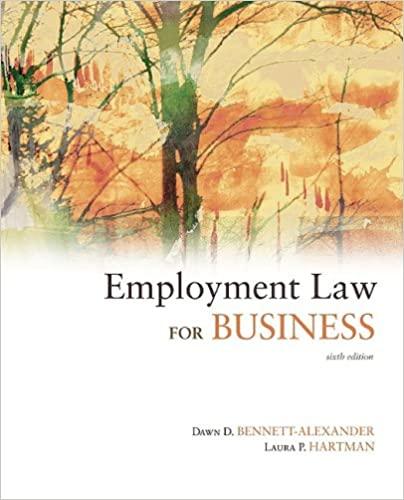Question
Please help me on these qeustions 1.A contract can come to an end because of ... A.performance B.frustration C.lapse of time D.all of the above
Please help me on these qeustions
1.A contract can come to an end because of ...
A.performance
B.frustration
C.lapse of time
D.all of the above
2.What is frustration?
A.Where one party regrets their commitment, or faces hardship, inconvenience, or material loss
B.Where the right to sue for breach of contract has become statute barred
C.A supervening event beyond the control of the parties that has made the contract incapable of performance
D.An anticipatory breach of contract
3.Restitution is...
A.the imposition of a penalty as retribution for an offence
B.a remedy available where someone has benefited at the expense of someone else and it would be unjust to allow that person to keep the benefit
C.the award of money or something else in recognition of loss or injury
D.the setting aside of the contract and restoring the parties to the position they were in before the transaction took place
4.What is a liquidated damages clause?
A.A term not explicitly written or spoken but put into the contract by legislation
B.A term that limits the liability of one of the parties
C.A statement, promise, or representation made after the contract has been formed
D.A clause that specifies the amount of damages recoverable by one party if the other party breaches the contract
5.What does privity of contract mean?
A.Only a party to a contract has any rights under the contract
B.A plaintiff seeking compensation for breach of contract must prove that the breach caused their losses
C.A court order requiring a person to fulfil their agreement under a contract
D.Compensation is a reward given to the plaintiff for taking legal action
6.The case of Donoghue v Stevenson is also known as the ...
A.'snail in the garden' case
B.'message in the bottle' case
C.'snail in the bottle' case
D.'message in the garden' case
7.What is the second element of negligence that must be proven by a plaintiff when suing a defendant in negligence?
A.The defendant breached a condition of the contract
B.The defendant breached their duty of care by failing to meet the standard of care
C.The defendant owed the plaintiff a duty of care
D.The defendant is jointly liable for the wrongful acts of the partnership
8.In negligence, what is meant by the term 'causation'?
A.To be recoverable from the defendant the losses incurred must actually be caused by the negligent act
B.Where a person is also careless regarding their own safety the court will apportion the negligence between the plaintiff and the defendant and award damages accordingly
C.Every action we take carries some degree of potential risk to ourselves and to others
D.To be recoverable from the defendant the losses incurred must be reasonably foreseeable
9.Which party owes a recognised duty of care?
A.Authorities - to those they govern
B.Occupiers - to their visitors and tenants
C.Manufactures - to consumers
D.All of the above
10.Where a person has understood and accepted the risks involved before participating in a dangerous activity this is called ...
A.voluntary assumption of risk
B.negligent misstatement
C.contributory negligence
A.standard of care
Step by Step Solution
There are 3 Steps involved in it
Step: 1

Get Instant Access to Expert-Tailored Solutions
See step-by-step solutions with expert insights and AI powered tools for academic success
Step: 2

Step: 3

Ace Your Homework with AI
Get the answers you need in no time with our AI-driven, step-by-step assistance
Get Started


